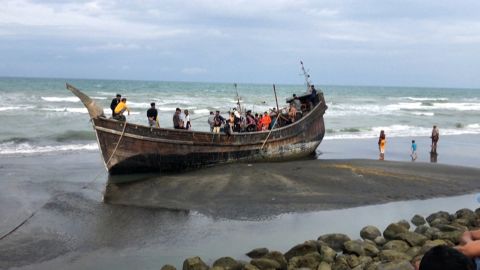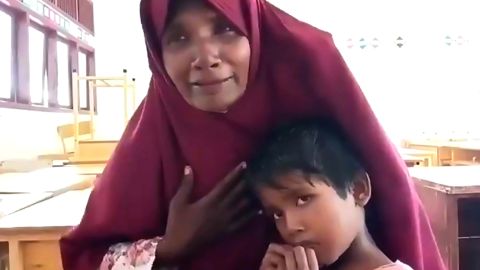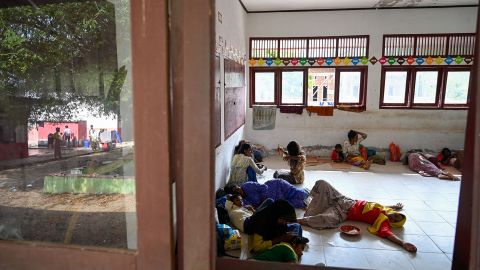Aceh, Indonesia
CNN
—
Hatemon Nesa weeps as she clings to her 5-year-old daughter, Umme Salima, at a rescue shelter in Indonesia’s Aceh province. Their faces appear gaunt, their eyes sullen, after drifting for weeks at sea on a boat with little food or water.
“My skin was rotting off and my bones were visible,” Nesa said. “I thought I would die on that boat.”
Nesa also cries for her 7-year-old daughter, Umme Habiba, who she says she was forced to leave behind in Bangladesh – she couldn’t afford any more than the $1,000 the traffickers demanded to transport her and her youngest child to Malaysia. “My heart is burning for my daughter,” she said.
Nesa and Umme Salima were among around 200 Rohingya, members of a persecuted Muslim minority, who embarked on the dangerous voyage in late November from Cox’s Bazar, a sprawling refugee camp in Bangladesh crowded with around a million people who fled alleged genocide by the Myanmar military.
But soon after they left, the engine cut out, turning what was supposed to be a 7-day journey into a month-long ordeal at sea, exposed to the elements in the open-topped wooden boat, surviving only on rainwater and just three days’ worth of food.
Nesa said she saw starving men jump overboard in a desperate search for food, but they never returned. And she witnessed a baby die after being fed salt water from the sea.
As the weeks wore on, the passengers’ families and aid agencies pleaded with governments in multiple countries to help them – but their cries were ignored.
Then on December 26, the boat was rescued by Indonesian fishermen and local authorities in Aceh, according to the United Nations refugee agency (UNHCR). Of the 200 or so people who boarded the boat, only 174 survived – around 26 died on the boat, or are missing at sea, presumed dead.
Babar Baloch, an Asia spokesperson for the agency, said after a lull during Covid, the numbers of people fleeing are back to pre-Covid levels. Some 2,500 boarded unseaworthy boats last year for the journey, and as many as 400 of them died, making 2022 one of the deadliest years in a decade for Rohingya escaping Cox’s Bazar.
“These are literally death traps that once you get in … you end up losing your life,” he said.
Nesa and Salima’s journey began on November 25 from the overcrowded refugee camps in Cox’s Bazar, where she said her children couldn’t go to school, leaving her with little hope for their future.
Nesa said she had carried around two kilograms of rice for the journey, but shortly after the boat left the port, its engine died and they started drifting.
“Starving with no food, we saw a fishing boat nearby and tried to go close,” she said, crying as she recalled the horror. “We jumped in the water to swim close to that boat but in the end, we could not.”

During December, as the boat bobbed aimlessly in the Bay of Bengal, the UNHCR said it was spotted near India and Sri Lanka. But the agency said those countries “continuously ignored” its pleas for intervention.
CNN has contacted the Indian and Sri Lankan Navies for comment but has not received a response. Last month, the Sri Lankan Navy said in a statement that its crews had made a “strenuous effort” to rescue another boat carrying 104 Rohingya, including many women and children, who had fled Bangladesh.
On December 18, Nesa’s brother, Mohammed Rezuwan Khan, who is in Cox’s Bazar, shared with CNN an audio clip of a harrowing phone call he received from one of the refugees aboard Nesa’s boat.
“We are dying here,” the man said via satellite phone, according to the recording. “We haven’t eaten anything for eight to 10 days. We are starving.”

Nesa said the boat’s driver and another crew member jumped into the ocean to find food, but they never returned. “I think they got eaten by fish in the sea,” she said.
Twelve other men entered the water, while holding onto a long rope attached to the boat to try to catch something to eat, but as others on the boat tried to pull them back in, the rope snapped, Nesa said. “They could not return to the boat.”
While all countries are bound by international law to rescue people in distress at sea, swift action is not always forthcoming – particularly where Rohingya refugees are concerned, according to Baloch, from the UNHCR.
“I think everyone will agree as human beings that we have the responsibility you want to save one life in distress, let alone hundreds of people dying,” Baloch said. “(Nearby states) have to act to save these desperate people. It has to be an action which is in coordination done collectively by all the states in the region.”
Nesa and Umme Salima were among the 174 emaciated survivors shown on video setting foot on land for the first time in weeks in late December, some immediately collapsing onto the sand of an Aceh beach, too weak to stand.
They are among the more fortunate ones – the UNHCR believes another 180 are presumed dead, lost at sea on another boat since early December, when the occupants stopped communicating with their families.
The survivors from Nesa’s boat are now receiving medical care in Aceh, however it remains unclear what might happen to them in the coming weeks and months.

Indonesia is not party to the UN Refugee Convention and lacks a national refugee protection structure, according to the UNHCR.
For those found to be refugees, UNHCR will begin to look for one of a range of what solutions, including resettlement to a third country or voluntary repatriation, if a person is able to “return in safety and dignity.”
This marks the start of a new chapter for the group of passengers, who have lived for years in overcrowded, unhygienic and unsafe refugee camps in Bangladesh, after fleeing decades of systematic discrimination, widespread brutality and sexual violence in their home country of Myanmar.
“Stateless, persecuted, these Rohingya refugees have known little peace,” said UNHCR’s Baloch.
Much more needs to be done by the international community for the persecuted group, who suffer on a scale most cannot imagine, he added.
For Nesa, the hope remains that she might be reunited with her other daughter some day.
“I was about to die (in Bangladesh),” she said. “Allah gave me a new life … My children should get a proper education. That is all that I wanted.”